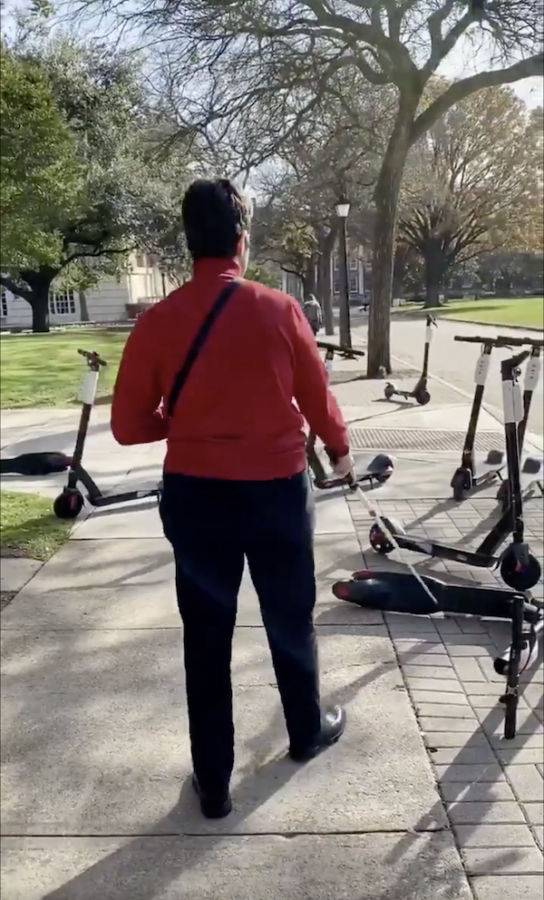By: John Kalkanli
I am currently studying Human Rights in the Doctor of Liberal Studies Program. My research will specifically focus on the legacies of the disability Rights Movement in America and how they shaped our ideas of social justice.
Disability rights are not discussed in the realm of human rights. However, a person cannot discuss human rights if he or she chooses not to be inclusive. My contribution will be to ensure that the provisions of the Americans with Disabilities Act are being followed by institutions.
“A person cannot discuss human rights if he or she chooses not to be inclusive.”
Throughout my seven years here, I have experienced firsthand the enhancements on campus to create a more accessible environment. For example, a talking elevator was placed in Dallas Hall this year, which made me very pleased because visually impaired people such as myself can more easily ascertain which floor they are on.
Minor incidents do occur when the campus is under construction, in that it can be difficult to get around obstacles when I am walking on campus. There are certain routes I walk from one building to another, and construction blocks them. However, I understand that construction and renovations take place to grow our university and implement a more welcoming institution of higher learning.
The biggest challenge has been maneuvering through electric scooters.
Ever since these devices came to campus this past spring, I have had difficulty navigating around campus safely and independently. There have been several instances when I almost tripped and injured myself because these scooters were haphazardly parked right in the middle of pedestrian walkways, buildings, wheelchair ramps, or staircases. There have also been times when my cane got stuck in the wheels of the scooters.
https://twitter.com/JohnKalkanli/status/1202441597658513408?s=20
I am speaking from a visually impaired person’s point of view, but these devices can also cause trip hazards and injuries to those in the SMU community who are sighted. There needs to be at least three feet of sidewalk left for people to walk on. Otherwise, it will become harder to walk on sidewalks.
I would like to see additional training and stricter rule enforcement concerning dockless scooters. E-scooters are different from automobiles in that a person cannot simply grab a car key and begin driving without a permit or license. While the app may direct people to do certain things, it would be much better if one on one instruction was received by an instructor on how to operate the device. Once comfortable, individuals could proceed with driving.
https://twitter.com/JohnKalkanli/status/1202466368832122881
I also propose that additional parking spaces be designated specifically for e-scooters. It would be even better if dockless mobility parking boxes be installed around campus. These parking boxes would encourage all members of the SMU community to be mindful of others by not randomly leaving these devices anywhere. As a result, our accessibility would not be impeded by obstacles.
The last resort to this issue would be fining individuals who do not comply. In the past when my mother dropped me off, the officer issued us a citation several times even though he knew that I have special needs and that we have a placard allowing us to park in reserved spaces. My mother still gets questioned by the officer despite the fact that the car is parked in a location where it can be seen for only 1-2 minutes while she escorts me from the car to the door. Electric scooters, on the other hand, stay untouched in more obtrusive locations, and they do not get ticketed.
I am very proud and honored to be attending an institution that goes the extra mile to help students reach their highest potential. SMU combines beauty with state-of-the-art facilities such as Meadows Museum, the George W. Bush Presidential Library, and Dallas Hall at the heart of SMU. The clean grounds, tree-lined streets, and flowers add to this beauty. In expressing these issues and solutions, I hope to make our beautiful community stronger, more accessible, and to foster an environment where everyone is respectful of the boundaries of others.
John Kalkanli is a graduate student studying Human Rights in the Doctor of Liberal Studies Program.
The Daily Campus welcomes opinion contributions from students, faculty, and community members. Submissions should be no more than 1000 words and are subject to copy editing. Please email submissions to smudailycampus@gmail.com, and include a cell phone number and a short biography.





















